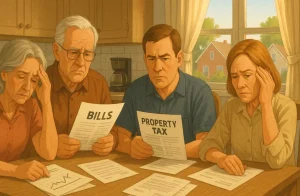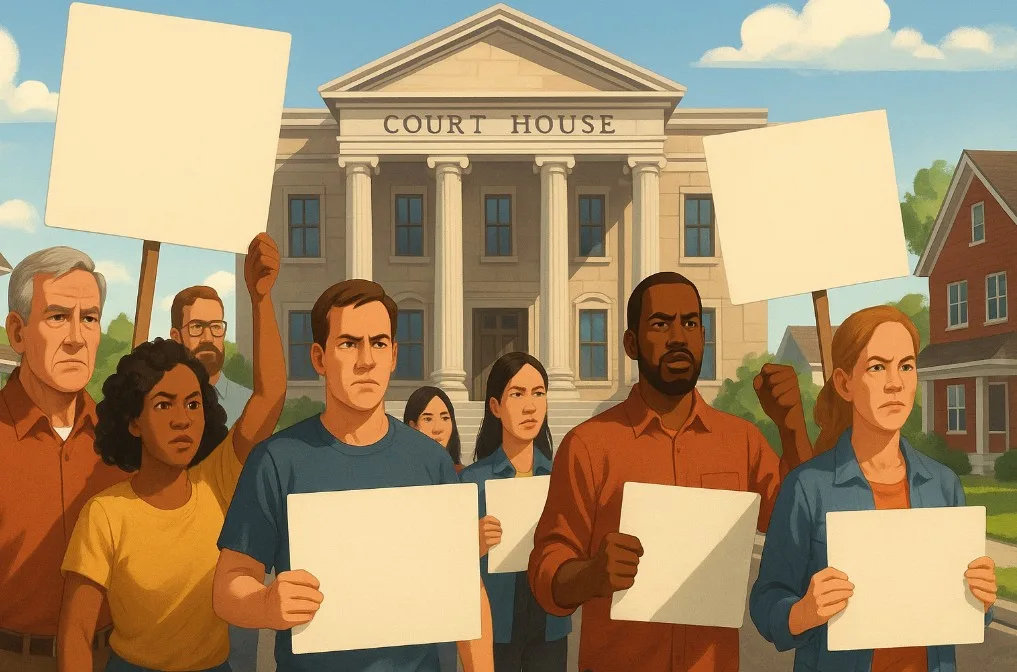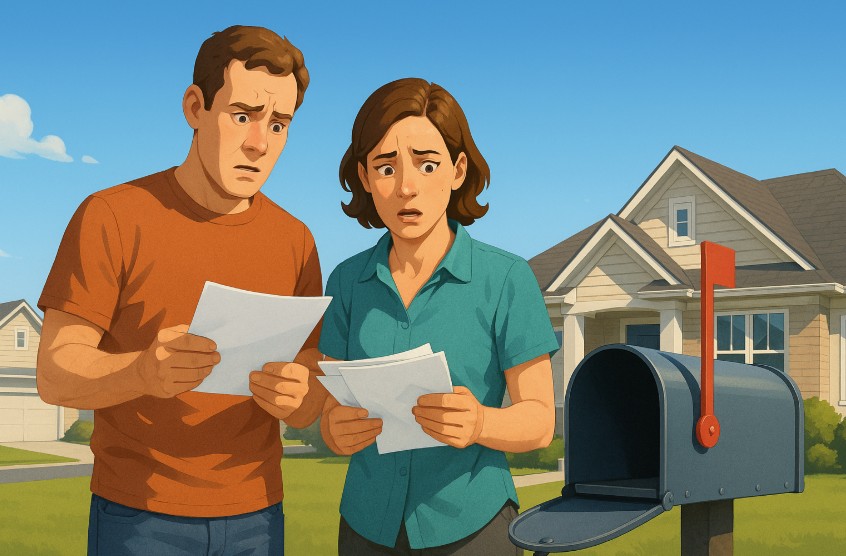A growing property tax revolt is making waves across the United States, fueled by rising home values and economic strain on American households.
What was once considered a fringe movement is now pushing into the political mainstream, gaining traction among conservative leaders and frustrated homeowners.
As more states consider serious tax reforms or abolition efforts, the debate over the future of property taxes has never been more intense.
With implications for schools, local governments, and national politics, the property tax revolt could mark a pivotal shift in how America funds its communities.
Why Are Homeowners Across the U.S. Rejecting High Property Taxes?

Across the nation, homeowners are expressing frustration with what they see as an unfair and rapidly escalating burden, property taxes.
While property values have soared in recent years, incomes have not kept pace, leaving many feeling squeezed by ever-higher tax bills.
The following are key reasons for the growing backlash:
- Rapidly Increasing Home Values: Since 2020, real estate prices have surged far beyond the rate of inflation.
- Fixed Incomes: Many elderly or retired homeowners struggle to afford taxes that don’t align with their stagnant income.
- Visible Tax Bills: Unlike sales or income taxes, property taxes come as lump-sum payments that are hard to ignore.
- Minimal Local Representation: Many feel their tax dollars are poorly managed by local governments.
- Uneven Impact: Property taxes hit hardest in states with no income tax or with high rates of homeownership.
These issues have created fertile ground for protests, reform proposals, and legislative challenges across political and geographic boundaries.
Is This the Second Coming of Proposition 13?
The modern property tax revolt mirrors an earlier era, specifically the 1970s, when California passed Proposition 13. That ballot initiative, passed in 1978, capped property tax rates and limited annual assessment increases.
It was a direct response to soaring home prices and tax bills, and it catalyzed a nationwide wave of anti-tax sentiment that helped redefine Republican politics.
Today’s revolt echoes those historical dynamics, with the post-pandemic housing boom serving as a catalyst.
While conditions are different, such as wider media coverage and broader partisan frustration, the essence remains the same: taxpayers demanding structural change.
Who Are the Key Political Figures Driving the Movement?

The property tax revolt is no longer a grassroots whisper; it’s now amplified by high-profile political leaders and influencers advocating for reform or abolition.
Key figures leading the charge:
- Ron DeSantis: Proposing bold reforms in his state and promoting a future without property taxes.
- Marjorie Taylor Greene: Framing the issue as a matter of freedom and ownership rights.
- Elon Musk: Equating property taxes to perpetual rent from the government.
- Brian Harrison (TX): Advocating for a constitutional amendment to end property taxes by 2031.
- Vivek Ramaswamy: Initially calling for zero property taxes, later suggesting caps as a compromise.
These voices are rallying support and pushing legislation forward in key battleground states, fueling momentum at state and national levels.
Could the Property Tax Revolt Reshape Republican Politics?
This growing anti-tax movement is not just reshaping homeowner sentiment; it’s rapidly altering the priorities within the Republican Party. Tax abolition has evolved from a niche libertarian idea into a central plank for GOP hopefuls.
With strong grassroots energy and donor interest backing the effort, tax reform is becoming a litmus test for conservative leadership.
Candidates are increasingly using anti-property tax messaging in campaigns, gaining popularity among voters disillusioned with government spending.
As a result, the revolt may redefine future legislative agendas, budgets, and party alignment at both the state and federal levels.
Are Local Governments Prepared for a Post-Property Tax Future?

Local governments have long relied on property taxes to fund essential services such as education, emergency response, and infrastructure.
Eliminating or significantly reducing these taxes poses a major risk to their operational stability. While advocates argue for smaller government, many municipalities lack the fiscal alternatives needed to fill the massive revenue gap.
Without this foundational revenue stream, public services could face cuts, delays, or full collapse, especially in rural areas that lack diverse tax bases or economic alternatives.
What Would Happen to Schools, Police, and Local Services?
As 70% of local revenue comes from property taxes, eliminating it would drastically reduce funding for:
- Public Schools: Teacher layoffs, increased class sizes, and outdated resources.
- Police and Fire Departments: Reduced emergency response capacity.
- Road Maintenance: Infrastructure decay and delayed repairs.
- Libraries and Parks: Closures or privatization.
Many of these services are already stretched thin, and further budget cuts could erode community stability and safety.
Can States Rely on Sales and Tourism Taxes Alone?
While some states, like Florida, benefit from high tourism-related revenues, most cannot rely on these streams alone. Sales tax is less stable during economic downturns and disproportionately affects low-income households.
Additionally, rural and residential communities often lack the commercial infrastructure to generate sufficient replacement revenue.
Even in states with strong tourism economies, experts warn that eliminating property taxes without robust, structured alternatives is not fiscally responsible.
Is the Movement Really Grassroots or Elite-Backed?
While the revolt presents itself as a grassroots uprising of overburdened homeowners, it is increasingly supported, and in some cases led, by wealthy individuals and conservative interest groups.
However, the blend of grassroots frustration and elite endorsement has created a potent political force.
- Local campaigns in states like Michigan and Ohio are citizen-led.
- Major donors are beginning to influence state-level policy through strategic funding.
This hybrid model has broadened the movement’s appeal, creating both authenticity and momentum.
Why Did North Dakota Reject Property Tax Abolition?

The debate over property tax abolition has gained momentum across the United States, but not every state is ready to take the leap.
North Dakota’s recent rejection of a ballot measure to eliminate property taxes highlights the complexities of such sweeping reforms.
Strong Bipartisan Resistance
In North Dakota, a proposal to abolish property taxes was rejected by a two-to-one margin. Despite the state’s conservative leanings, voters sided with local leaders, unions, and business coalitions who argued the risks outweighed the benefits.
Local Impact Concerns
Citizens worried about the impact on essential services, particularly schools and emergency services. Many felt the measure lacked a viable plan to replace lost funding, which would place pressure on rural communities.
Message to Other States
The defeat sent a cautionary message: voters support tax reform but are skeptical of complete abolition without clear solutions. It emphasized the need for thorough planning and widespread public support before attempting such sweeping change.
Could This Be the Beginning of a National Shift in Tax Policy?
With momentum growing, several states are exploring drastic reforms through ballot initiatives or legislative amendments. Recent voter-backed referendums in nine states prove this issue transcends political ideology.
However, while the movement is gaining steam, widespread abolition of property taxes remains a complex, state-specific challenge.
Still, the rising pressure is influencing how governments think about taxation, public accountability, and ownership. Whether this results in reform, replacement, or resistance, the debate is now fully engaged at the national level.
Conclusion
The property tax revolt is no longer a fringe concern, it’s a nationwide political and financial movement.
Driven by rising property values, income disparity, and political opportunity, the calls to reduce or abolish property taxes are shaping conversations in legislatures and living rooms alike.
Whether states ultimately move forward with full abolition or introduce more targeted relief measures, the debate has ignited a reckoning with how Americans fund their communities and define property rights.
Frequently Asked Questions
How do property taxes compare to other forms of taxation in the U.S.?
Property taxes are more stable than income or sales taxes and primarily fund local services. They’re consistent but often feel more burdensome due to visibility.
Are any states close to fully abolishing property taxes?
Some states like Florida and Texas are exploring phased-out models. However, no state has successfully eliminated them entirely yet.
How do property tax caps work in practice?
Caps limit annual increases in property tax assessments or bills. California’s Proposition 13 is the most well-known example.
What are the arguments in favor of eliminating property taxes?
Supporters believe property taxes violate ownership rights and disproportionately affect seniors and low-income residents. They also argue for smaller government models.
What are the main risks of abolishing property taxes?
The biggest risk is underfunding critical public services. This could lead to declining infrastructure and reduced emergency support.
How are renters affected by property tax changes?
Renters often see higher rents when property taxes increase. Landlords pass these costs on as part of operating expenses.
Could property taxes be replaced with usage-based fees?
Some propose replacing taxes with service fees like park passes or tolls. Critics argue this could limit accessibility for lower-income residents.
Source: https://edition.cnn.com/2025/09/07/politics/property-taxes-abolish-florida-texas




